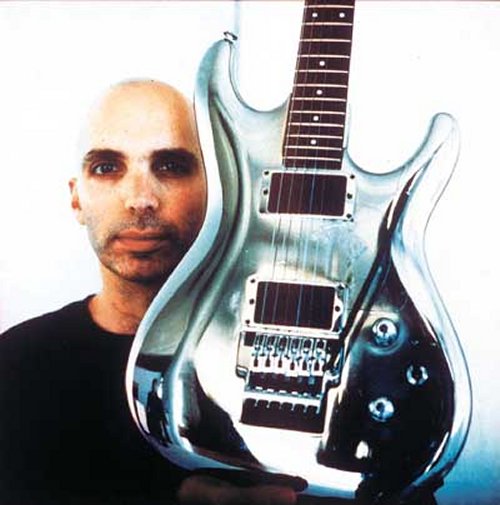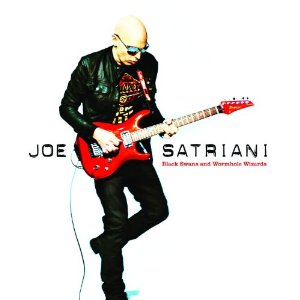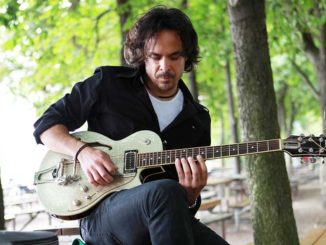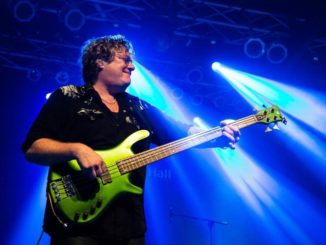
Shane gets deep and meaningful with the guitarist’s guitarist, Joe Satriani.
J: Hi Shane, this is Joe.
S: Hi Joe. Thank you so much for talking to us.
J: You’re welcome. Whats up?
S: Well, new album – fantastic!
J: Thank you
S: Where did the title come from?
J: Oh you know I was, reflecting on how the songs that I picked for this album were so different, the phrase that I have known for many years , Black Swan, crept up in my mind cause I was thinking, boy when people hear this they are gonna be surprised and, some of the songs will surprise them because they didn’t know I played that way – so I think probably songs are like black swans and they will be unexpected, will surprise people but once they really get to know them they will realize that’s part of my musical message. And I was thinking it would make a cool title for an album [but] it’s a bit too bleak all by itself, so I thought if I combined it with something that was totally opposite that it might have a good ring to it. And I thought the Wormhole Wizards is a song that I wrote about travelling through distant galaxies with the help of going through wormholes would be a great sort of yin and yang sort of approach to tag onto it, so in the end we wound up with “Black Swans and Wormhole Wizards”.
S: Which works well for us in Western Australia because the black swan is our fauna emblem.
J: I know and I thought it was very interesting ‘cause the phrase started in Greece about 2000 years ago because they had never seen a black swan. So the phrase meant that if they say something like “Well, that’s about as likely to happen as seeing a black swan”, and that phrase caught on and was used in English literature and wound its way into Americana , but of course in recent times, once Australia was on the map people realized that black swans aren’t that unusual.
S: We just like to be different over here, that’s all!
J: That’s why we love you so much.
S: After so many albums where do you keep finding inspiration from?
J: Oh, everyday life just throws so much at ya that, I mean, how could you NOT find inspiration? Daily life is just complex and you know I go through everything just like everybody else does, so there isn’t a lot to filter through. You know, I’ve been on tour with Chickenfoot and made a live DVD and gone through a lawsuit and then my mother died right at the end of the year and… you know, I think I arrived at January 1st thinking I’ve got a ton to write about.
S: Yeah, no doubt and I’m sorry to hear about your mother, I didn’t realize that.
J: Yeah, well, thank you.
S: So the guitar? Does it still hold that sort of magic for you?
J: Well for me, yes, it certainly does. I don’t know why the guitar yields to my desires so much but thank God, cause I’m not that good at other instruments. But when I’m with a guitar my emotions just get on that instrument and I can make it sing and so its been part of my life since I was 14 years old and its really been something.
S: And is that story true that you had heard that Jimi Hendrix had died, so you quit the football team and just dedicated yourself to being a guitarist?
J: Yeah, that’s very true. You know I had been a drummer since I was 9 years old and had sort of given up on being a good drummer cause I just realised that I just didn’t have it in me, and for a few years I was just a super Jimi Hendrix fan and I wasn’t worried about being a musician any more. And that day I was all suited up with the helmet and all the gear with American Football that you gotta wear and one of my team mates just happened to mention to me that he had heard that Hendrix had died and I just turned around and took my gear off and quit the team and went home and announced to my family that that was what I was gonna do.
S: It’s good to check these things. You know, Wikipedia isn’t always the most accurate research tool.
J: Right, yeah!
S: I really liked quite a few of the songs on “Flying in a Blue Dream” where you were singing on them. Are you ever tempted to add a lyric or do a song with some lyrics in it?
J: Yeah, sometimes when I’m in the mood, it’s great. Back then it was a really cool thing to be able to include that on the record. I was really happy that the label let me do it at the time because when you are a new artist like that you really wanna show the people all the things that you can do. You don’t want to become famous for just one thing ‘cause it just secures a very short career. So that album had, you know, not only me singing on it, but me playing in so many different styles.
S: Yeah

J: That had 18 songs on that album didn’t it?
S: Yeah, it seemed like it went on forever – but in a good way.
J: Big album. But I think what happened was that I was able to show myself that I’m not just “Surfing with the Alien”, I’m all these other things. I think it was a good signal to the fans because they sort of gave me license after that to try all sorts of stuff and I have certainly put out lots of different sounding records over the years and my fans have been very supportive of letting me follow my artistic muse.
S: And because “Surfing with the Alien” was such a huge hit around the world, was that sort of a reaction to consciously break out of any preconception with that?
J: Well you know, the thing is with that, when you make a record – and this is certainly when you go back to those days, back in the late 80s – you make a record and it hangs around for months. I finished that record in the Summer of ‘87 and it didn’t come out until late October and the world really didn’t catch onto listening to in until the early days of ‘88 and by then it seemed like I had lived a lifetime. By the time it was getting popular I had already gotten a job playing lead guitar with Mick Jagger which ultimately brought me to Australia.
S: Yeah, we saw you on that tour and it was fantastic.
J: And so the record kind of really took off as I was in Australia in late ‘88. By then [for me], “Surfing…” was kinda like an old record. I had kinda moved on from there you know and I had learnt how to do new things and I wanted to do different things and so I thought that the experience of touring that whole year also had a big effect on me. The other thing I would love to mention to you is that people don’t realize that in the beginning of 1988 – I had never toured as a solo artist [not to mention] I had never toured as a solo artist who didn’t sing. I was doing something for the very first time and it was very unusual. I mean I had toured for about 3 weeks and then I got the job with Jagger, went and hung out with him for about 2 months and then went on tour again for about 6 months on my own. And that was when I really learned how I was supposed to do something like “Surfing with the Alien” with a live audience. Then I went back on tour with Jagger and at the end of the year we released the EP “Dreaming # 11” and I was in the studio for within a month of starting to record “Flying in a Blue Dream”. It was a very unusual series of events that led me to that record, so I was full of all these experiences.
You know, the first time being a solo artist, first time playing in a band led by Mick Jagger and, you know… So I think “Flying in a Blue Dream” reflects that incredible whirlwind year of 1988.
S: Yeah, it’s a great album. How do you go about naming an instrumental song?
J: Well the title very often comes first, not all the time but most of the time I know what I’m writing about and I’ve written down either the title very succinctly or I have written down a longer version of the title or a little story, maybe I draw some pictures. You never know how I’m documenting this stuff but it usually drives me into finishing the song properly. You know ‘Wind in the Trees’, I had that title back when I was about 16 years old and I’ve been working on it ever since.
S: [laughs]
J: Ummm, you know ‘Goddess Crying’, that came right at the beginning, the same with ‘Solitude’ and ‘Littleworth Lane’, ‘Light Years Away’… and ‘Dream Song’ of course I couldn’t call it anything else cause I wrote it while I was dreaming, so there you go.
S: And something like ‘Mystical Potato Head Groove Thing’…?
J: Well, now that was a funny one. I was working on this riff and my brother called me on the phone and I was in the middle of a very creative moment and so my brain was like in an altered state. And so I’m sitting there talking to him on the phone and I was just sort of scribbling things down on a piece of paper and when the phone call was over I realized I have written down ‘Mystical Potato Head Groove Thing’…
S: Oh cool
J: And I thought well that must be the title I guess.
S: You gotta love it when you channel something from the other side, you know.
J: Yeah the album, they are almost… they’re ethereal. They have a “new age” edge to them.
S: Do you think that some of them could work as hard rock meditation music, almost?
J: Ah, you know all my music can transcend in that way. It’s a big difference when you don’t have a singer. It means that you don’t have someone screaming at you saying “listen to what my idea of what the song is about”, and the biggest difference with instrumental music is that it really allows the listener to make up their mind about what the song is about and if they want to use it for meditation or they want to use it to drive really fast or when they are snow boarding or when they are having sex, or they’re eating, I don’t care what it is. That’s their perogative you know.
S: Yeah, you’re right – it’s got that, its just got a cleanliness and a purity to it.
J: You know I strive for that, I like to make things very pure because I think it allows the listener to really get the feeling behind the music. It also gets their imagination going which I think is very important.
S: Absolutely. How’s the second Chickenfoot album coming along?
J: Well, you know I delivered about 10 demos to the guys. I finished working on this record and we just did 2 shows over the weekend and we’re just so fired up to record but we won’t get to do that until late January. But we definitely have written down in our employment calendar that we are going to meet again in late January and I hope that those guys will, you know, take all those songs I’ve written and do their part. ‘Cause generally Sammy will come up with his own melodies and lyrics and Mike and Chad will join in the rearranging and sometimes will write an extra part if they think it needs it and then we all get together and we basically, you know, throw all of our ideas together and see what we can do and then record it right then and there. That’s how we did the first record and so that’s probably how we are gonna do the second.
S: And it really sounds like all of you are enjoying working in a collaborative band. You have all had very strong individual careers…
J: Yeah, it’s a really very exciting band and we still really have a great time on stage and we love connecting to our fans and ah, I hope that the second record will be even better than the first and we will get a chance to tour a little bit more.
S: And hopefully Down Under.
J: That would be a dream come true. That would be really great.
S: And for us as well. [laughs]. For a while back there you got a reputation as a guitar teacher to the stars – I know that some local guitarists would pretty much sell their grandma for a lesson with you. Are you still teaching at all???
J: I don’t do grandma, no.
S: So do you still teach at all if somebody comes along and asks for a lesson? Do you still consider it?
J: I, you know, I really don’t have time for that. I get people asking me all the time, travelling around the world, you know, wanting to take lessons from me or something but my schedule keeps me so busy and between my own family and this [career] there’s really no room for private teaching right now.

S: Ah well, I will tell my local guitarist friends to keep their grandmas OK?
J: OK [laughs]
S: Which album or song would have most liked to have had a hand in creating?
J: Oh wow. Um… You know there is so many out there, I mean, you know the little ones. You know I would love to say I played on “Exile on Main Street”, came up with ‘Casino Boogie’. I would love to say that I actually wrote and played the solo on ‘Comfortably Numb’…
S: Well, wouldn’t we all.
J: And then of course just about every Hendrix record. I would love to say I was the mastermind behind all of that.
S: For sure. I think I am gonna have to let you go in the next half a minute or something so the last question I ask all of our interviewees is a little bit of insight. What, for you, is the meaning of life?
J: The meaning of life is, ah, understanding love and how you have to love as many people as you can and to be accepting of it and it is the most important thing, the relationship with the people in your life.
S: And do you try to put that into you music?
J: I think I’ve tried on every record. I keep trying. I mean you know the whole thing love it seems like a sappy thing to talk about but it really is the thing that gets us from when we are born into this world to when we are old. I mean that is the only thing that gets us there and its really not the money or anything else it’s the people that help us, and we don’t get anywhere without the help from each other and you know I’ve written lots of songs about it and um, and I will probably keep going cause its so hard to nail down, to get it right. I’ve written a million songs about it and I still feel like I have to write another million you know.
S: So who are your favorite guitarists?
J: Oh you know the old guard like Hendrix and Jimmy Page and Jeff Beck and those guys were amazing. And a lot of guys like Jeff Beck and Billy Gibbons and Brian May, they are still viable guitar players and they make my jaw drop, they are just amazing. There are lots of great players out there. I’m a big fan of Steve Vai and not only because he’s one of my best friends, but I think he is really brilliant and Robert Fripp and I’m a big fan of a lot of the players that you maybe don’t hear about so much but I think you should, you know, certainly guys like Dave Mertone, um, Geoff Tyson, great guitar players.
S: Excellent. Do you find it very easy to switch between styles? I mean you play such a diverse range of music across your albums.
J: It just seems natural to me. I grew up listening to such a wide raft of music. You know I was the youngest of 5 kids, so my older siblings went through so many different music phases you know and I wound up with all their old records. And by the time they left the house I had all these really great records that were blues and British invasion and Motown and soul and funk and heavy rock and you know it was just everything you could think of and so that became part of my style. I mean it became the foundation of my style.
S: And the guys that you are playing with at the moment in your solo band, Stu Hay, I mean I saw you play here in Perth at the Concert Hall in what must have been the late 80’s. He’s obviously a good friend of yours?
J: Yes, he lives right here in San Francisco now and he has actually played on two songs on this new album.
S: Oh cool, he’s just an amazing player. I remember from that gig that he just blew us away.
J: Yeah, he’s a very unusual bass player, great personality and a good friend.
S: Well I’ll let you go. Thank you so much for talking to us.
J: You are very welcome.
S: And congratulations again. Another fantastic album and we are really looking forward to the new Chickenfoot as well and hopefully you will be down here playing in 2011.
J: I hope so.
S: Thank you so much.



